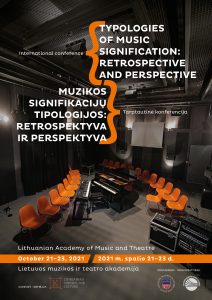INTERNATIONAL MUSICOLOGICAL CONFERENCE
2021 October 21–23
 LMTA Building 1: Julius Juzeliūnas Spatial Sound Sphere (Gedimino Ave. 42, Vilnius) / Live broadcast on tv.lmta.lt / Zoom link for online participants
LMTA Building 1: Julius Juzeliūnas Spatial Sound Sphere (Gedimino Ave. 42, Vilnius) / Live broadcast on tv.lmta.lt / Zoom link for online participants
INTERNATIONAL MUSICOLOGICAL CONFERENCE “TYPOLOGIES OF MUSIC SIGNIFICATION: RETROSPECTIVE AND PERSPECTIVE”
* Persons older than 6 years of age must wear a protective mask covering the nose and mouth (face mask, respirator, etc.). Only persons with the National Certificate (the Opportunity Passport) can participate in the events.
PROGRAMME
Thursday, October 21
- 9:30 Conference Opening
Session 1. Chair: Charris Efthimiou
- 9:45–10:45 Kęstas Kirtiklis. Searching for the Soul of Academic Disciplines: A Few Adventures in the Typology of the Humanities and Social Sciences
- 10:45–11:15 Evangelia Kopsalidou. Aristoxenus gènē and tonoi on Ancient Greek Lyres
- 11:15–11:45 Sigitas Mickis. Categories of Music Theory in Terms of Linguistic Communication
Coffee break
- 12:00–12:30 Christina G. Rojo. The “Retrospect” in Johannes Brahms’s work – or How a Piano Speaks Without Words
- 12:30–13:00 Małgorzata Grajter. Music and Mimesis: Revisiting Typologies of Musical Signs Based on Imitation
Session 2. Chair: Vincenzo De Martino
- 14:30–15:00 Vincenzo De Martino. A Case-Study of Creative Categories: the “Primitivistic” Style in Piano Music
- 15:00–15:30 Anastasiia Sharina. The Systematization of Piano Pieces Which Employ “Extended Techniques” (Based on Examples of Solo Works by Ukrainian Composers of the Second Half of the Twentieth to Early Twenty-first Century)
- 15:30–16:00 Charris Efthimiou. A Computer-assisted Analysis of Recordings of Musical Works Expressing Thunderstorms with the Target of Systematizing the Usage of this Weather Phenomenon since the Eighteenth Century
Lunch break
Session 3. Chair: Beata Baublinskienė
- 16:15–16:45 Tijana Vukosavljević. Storytelling in Instrumental Music – Claude Debussy’s Ballade
- 16:45–17:15 Marcos Krieger. Character Pieces, Program, and Ekphrasis: Imposed Semiotics or Overt Mitgesehen?
- 17:15–17:45 Adelina Yefimenko. Eine Begriffssuche zur Typologie der Opernprojekte in der Gegenwart
- 17:45–18:15 Anna Granat-Janki. Musical Signification in Agata Zubel’s Opera-Form Bildbeschreibung
Friday, October 22
Session 4. Chair: Rima Povilionienė
- 9:45–10:45 Wolfgang Marx. Musical Genres in the Age of Liminality
- 10:45–11:15 Olga Solomonova. Associative Musical Text: Definition, Typology, Research Methodology
- 11:15–11:45 Jonas Čiurlionis. Boethius: The Mathematical Structure of Music Principles
Coffee break
- 12:00–12:30 Iryna Tukova. A Problem of Typologization of Textures in Contemporary Art Music: The Post-Soviet Case
- 12:30–13:00 Anna Nowak. Methodological Approaches to Intertextuality in the Works of Contemporary Composers
Lunch break
Session 5. Chair: Božena Čiurlionienė
- 14:30–15:00 Jurgis Paliauka. Patterns in Organization of Musical Material in the String Quartets of Onutė Narbutaitė
- 15:00–15:30 Agnė Mažulienė. The Concept of Musical Precomposition: Contradictions, Practice, Typology
- 15:30–16:00 Jurgita Valčikaitė-Šidlauskienė. The Composing Process: Theories of Analytical Strategies and Combinational Perspectives in Classification
Coffee break
Session 6. Chair: Audra Versekėnaitė-Efthimiou
- 16:15–16:45 Baiba Jaunslaviete. Music Reviews as Signs of the Sociocultural Context: Comparative Case Studies of the Latvian, German, and Russian Music Criticism in Riga During the Late Nineteenth and Early Twentieth Centuries
- 16:45–17:15 Viltė Žakevičiūtė. Signification of Musical Variables as a Pattern of “State of Being Aesthetics”: The Problem of Musical Texture
- 17:15–17:45 Gabrielius Simas Sapiega. The Problem of Time and Space Terms in Gérard Grisey’s Discourses
- 17:45–18:15 Rachel Becker. Re-Approaching a Taxonomy of the Opera Fantasia: a Clarified Genre, a Clarified Context
Saturday, October 23
Session 7. Chair: Wolfgang Marx
- 9:45–10:45 Gražina Daunoravičienė. The Music Genotype as an Open, Self-Organizing System and its Seismic State in Music Evolution
- 10:45–11:15 Joan Grimalt. Mapping Musical Signification
- 11:15–11:45 Alla Korobova. Signification and Systematization in the Theory of Musical Genres
Coffee break
- 12:00–12:30 Olena Dyachkova. The Pastorale in Ukrainian Professional Music of the Turn of the Twentieth and Twenty-first Centuries: Genre, Mode, and Concept
- 12:30–13:00 Veronika Zinchenko. Typology of Modern Ballet
Lunch break
Session 8. Chair: Lina Navickaitė-Martinelli
- 14:30–15:00 Kalliopi Stiga. The Past and the Future of Greek Popular Song: From the Rebetikon to the Greek Trap?!
- 15:00–15:30 Lina Navickaitė-Martinelli. Classifying Performers’ Gestures: Corporeal Expression and Its Functions
- 15:30–16:00 John Fallas. “Talking About our Decisions”: Classifying Sprees and Grey Areas in the Consideration of Musical Genre
Closing of the conference
